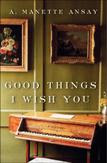I for one, will never say anything bad about a book again in print after reading about this Alice Hoffman Incident...
Well, who knows? But after Hoffman decimated a critic at the Boston Globe for a mixed review of The Story Sisters, the publishing world is abuzz about the changing relationship of reviewers and critics. We already acknowledge quite a bit of logrolling going on in the biz--the positive aspects to me are relatively harmless. But we've all heard of a "You gave me a bad review so one of my friends is going to destroy your reputation when your next book comes out."
is abuzz about the changing relationship of reviewers and critics. We already acknowledge quite a bit of logrolling going on in the biz--the positive aspects to me are relatively harmless. But we've all heard of a "You gave me a bad review so one of my friends is going to destroy your reputation when your next book comes out."
Here's the piece from the Galley Cat blog.
Anyway, you'll have to talk to me in person about the books that left me cold. Because at least for a while (until I forget), no more negatalk! I'm afraid of reprisals. Will fans of Denis Johnson egg my house because I had to stop reading Tree of Smoke because I couldn't follow any of the characters? Maybe.
All this reminds me of the years when Publishers Weekly would do their annual column "The Red and the Black", where they would try to get folks to talk on record about books that didn't work. According to my friend wonderful-extremely-talented-and-such-a-good-writer Billy, it was quite hard to get anyone to say something negative.
Or here's another example. Ever notice there are almost never negative reviews of hotels and restaurants in travel guides? I guess you can assume that if something isn't listed, it's crappy, but what if it's just a sin of omission? Of course some would say "Why would you include someplace not to go in a travel guide?" But sometimes you do have to tell people where not to go or what not to read? Otherwise, what would be the point of that intelligent and erudite critic Michiko Kakutani, who I also hear is a snappy dresser and can read a map like nobody's business?
Well, who knows? But after Hoffman decimated a critic at the Boston Globe for a mixed review of The Story Sisters, the publishing world
 is abuzz about the changing relationship of reviewers and critics. We already acknowledge quite a bit of logrolling going on in the biz--the positive aspects to me are relatively harmless. But we've all heard of a "You gave me a bad review so one of my friends is going to destroy your reputation when your next book comes out."
is abuzz about the changing relationship of reviewers and critics. We already acknowledge quite a bit of logrolling going on in the biz--the positive aspects to me are relatively harmless. But we've all heard of a "You gave me a bad review so one of my friends is going to destroy your reputation when your next book comes out."Here's the piece from the Galley Cat blog.
Anyway, you'll have to talk to me in person about the books that left me cold. Because at least for a while (until I forget), no more negatalk! I'm afraid of reprisals. Will fans of Denis Johnson egg my house because I had to stop reading Tree of Smoke because I couldn't follow any of the characters? Maybe.
All this reminds me of the years when Publishers Weekly would do their annual column "The Red and the Black", where they would try to get folks to talk on record about books that didn't work. According to my friend wonderful-extremely-talented-and-such-a-good-writer Billy, it was quite hard to get anyone to say something negative.
Or here's another example. Ever notice there are almost never negative reviews of hotels and restaurants in travel guides? I guess you can assume that if something isn't listed, it's crappy, but what if it's just a sin of omission? Of course some would say "Why would you include someplace not to go in a travel guide?" But sometimes you do have to tell people where not to go or what not to read? Otherwise, what would be the point of that intelligent and erudite critic Michiko Kakutani, who I also hear is a snappy dresser and can read a map like nobody's business?
(That last compliment is a secret reference to one of my favorite but long-out-of-print novels, by the way. But you have to agree it is quite an important skill.)
I could not find a bad review of this place in any travel guide.
Maybe the owners of the Galt House send hate mail to any travel writer who dares to speak ill of them. Eventually I posted my review on a travel site.
Which leads to the irony of the whole situation with book reviews. You can read a lot more negative things online about books than you ever could in the print media. So maybe the fear of reprisals will simply create a new equilibrium.
Or so poses that insightful-dyamic-almost-genius-like blog of Galley Cat.




















































